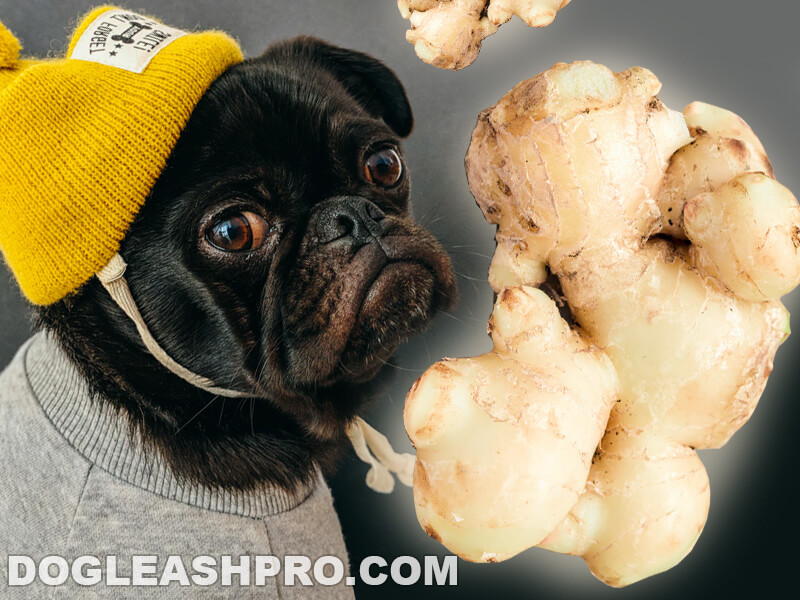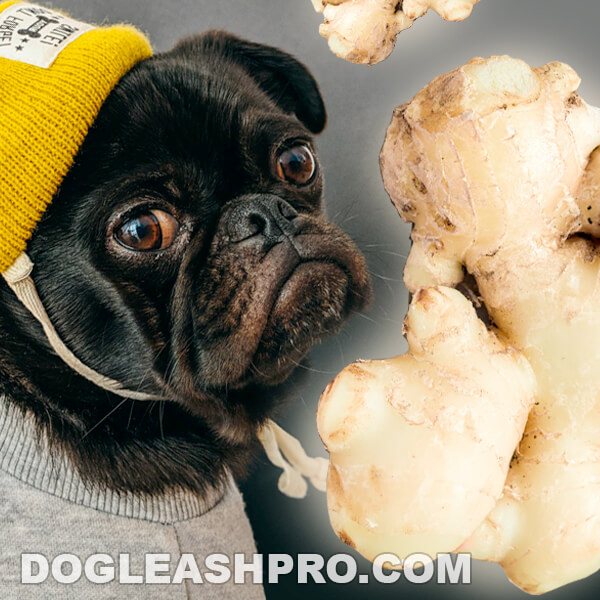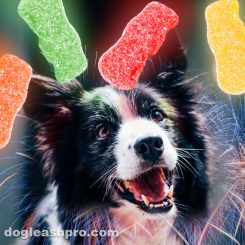
Ginger has been used for centuries throughout the world. Used for both medicinal purposes and as a spice to many dishes, Ginger has a fresh spicy yet herbal distinct flavor and smell. Ginger can be used to help with upset stomachs and nausea, but is it safe for dogs? If you’re wondering, can I feed my dog Ginger? You’ve come to the right place! Let’s find out!
Can dogs eat Ginger? Yes, dogs can eat Ginger in moderation. Ginger contains tons of antioxidants that are especially helpful to dogs. Additionally, Ginger has anti-inflammatory properties that can help dogs with arthritis and joint pain.
Table of Contents
Can dogs have Ginger?

Yes, dogs can have Ginger in moderation. Thankfully, Ginger in all forms, whether fresh, powdered, raw, juiced, or dried, are all beneficial to our furry friends. If you’re thinking about giving your canine family member some Ginger, the fresh Ginger option is the best choice. You can slice the Ginger into smaller pieces or grate it so that it is easier for dogs to consume it.
Fresh ginger is also great for dogs with inflammatory bowel disease or IBD. Most dogs with IBD have chronic or recurring cases of vomiting or diarrhea, causing them to lose their appetite and result in losing weight. If your pooch has IBD, try sneaking in some sliced fresh Ginger or grated fresh Ginger into their favorite food.
While fresh Ginger is great for dogs, we would still recommend that you consult with your dog’s veterinarian first and ask for their professional advice. Your vet knows your dog best and will help you determine whether Ginger will help with vomiting, diarrhea, and inflammatory bowel disease.
If your K9 friends do not like the smell or taste of fresh Ginger, you can use dried powdered Ginger or bake the fresh Ginger into their treats.
How much Ginger to give a dog?
The amount of Ginger you can give your furry friends depends on his or her size. The general rule of thumb for the amount of Ginger your pups can have is around 10 to 25 mg of Ginger for every pound of their body weight.
Here is an example if you have a small and a medium-size dog:
- A small 10 pound Chihuahua can have 250 mg of Ginger.
- A medium 70 pound Labrador can have 1,750 mg of Ginger.
Can dogs eat Ginger root?

Yes, dogs can eat Ginger root in small appropriate dosages. Can dogs have Ginger root? Yes, before you give your canine friends Ginger roots, be sure to slice them into small pieces or grate them first.
The right amount of Ginger root dosage for dogs is dependent on the dog’s weight. Stick to giving your furry friends around 10 to 25 mg of Ginger for every pound of their body weight.
Are dogs allowed to eat Ginger?
As we can see, Ginger is great for dogs and yes, dogs are allowed to eat Ginger. All forms of Ginger can provide a ton of health benefits to dogs so it really doesn’t matter if you’re giving it to them in fresh or dried form.
It really depends on whether your furry family member prefers the fresh grated Ginger or the dried powdered Ginger and the easiest way for you to administer that Ginger to them.
Be sure to slice the fresh Ginger into small pieces to prevent choking.
You might also like: Can Dogs Eat Bean Sprouts?
Is Ginger good for dogs?
Yes, Ginger is good for dogs and it provides many health benefits to your canine family member. Let’s find out how Ginger can help your precious pooch.
Ginger for dogs side effects such as nausea and motion sickness
If your pups are feeling nauseous, a little bit of Ginger will help. There are many reasons why a dog would get nauseous, either from chemo-induced treatment or motion sickness. If your pooch is undergoing chemotherapy, ask your vet if you can give him or her Ginger first. Sometimes Ginger may interact with the chemotherapeutic agents and this is not what we want.
Some dogs may get motion sickness from a car ride. If you know your dogs are prone to motion sickness, try giving them a little bit of Ginger at least 30 minutes before the car ride. Thankfully, Ginger has the same effect as Dramamine.
Ginger for dogs’ arthritis
Dogs with arthritis experience joint inflammation which is not only painful but also discomforting. The great thing about Ginger is that it can help dogs with joint pain and hip pain.
That’s because Ginger has anti-inflammatory health benefits and can help relieve joint and hip pain in dogs.
Ginger is great for dogs experiencing bloating and gas
Dogs with inflammatory bowel disease (IBD) or are experiencing bloating and gas from eating too much food such as Brussel Sprouts may benefit from having some Ginger.
Ginger will help with the following:
- Decrease the bloating and gas in dogs.
- Relaxes the muscle and spasms in the intestinal loops.
- Improve digestion.
As you can see, Ginger can help alleviate some of that pain associated with digestive issues.
Antioxidants in Ginger for dogs’ skin
The great thing about Ginger is that it is loaded with that good stuff called antioxidants. Antioxidants help to prevent stress in dogs and destroy harmful free radicals that can cause aging and DNA damage in dogs.
The antioxidants in Ginger can also fight off the following chronic diseases in dogs:
- Lung disease.
- Heart disease.
- High blood pressure.
When dogs have a little bit of Ginger, it can help promote healthy aging and give your dogs healthy skin. Ginger can also provide cognitive support.
Fun Fact: Papaya is packed full of antioxidants as well, but is it safe for doggy consumption? Check out Can Dogs Eat Papaya? to find out!
Ginger for heartworms in dogs
There have been studies that show that dogs with heartworms can benefit from having a little bit of Ginger. That’s because Ginger can reduce heartworm larvae in dogs by about 83% to 98%.
Ginger for dog cough
If your dog is coughing a lot, giving him or her some Ginger will help treat the cough.
Ginger oil for dogs
Ginger oil is also another form of Ginger that is safe for dogs. However, Ginger oil is not to be consumed. If your dog has an upset stomach or stomach illness, you can add 1 or 2 drops to your furry friend’s stomach or paws.
Again, if this is your first time administering Ginger oil for your canine friends, it’s best to consult with your vet first and ask for their advice and suggestion.
Is Ginger safe for dogs?
Yes, Ginger is safe for dogs, and the amount of Ginger our furry friends can have really depends on their body weight. As mentioned above, stick to the recommended dosage of around 10 to 25 mg of Ginger for every one pound of their body weight. You may also want to confirm the Ginger dosage with your dog’s vet.
Is Ginger ok for dogs?
Yes, Ginger is ok for dogs. Be sure not to give your dog too much raw Ginger. Stick to the recommended dosage.
Is Ginger bad for dogs?
Having a little bit of Ginger when your dog isn’t feeling well is a great option. However, there are times when Ginger can be bad for dogs. One such case is when you give your precious pooch too much Ginger. When dogs consume too much Ginger, they may experience several side effects such as:
- Having heartburn.
- Feeling nauseous.
- Becoming very gassy.
Handy Hint: The color and texture of your dog’s vomit can tell you a lot about why your dog is not feeling well and is throwing up. Be sure to check out Dog Vomit Color Guide for more information.
Also, Ginger has that spicy hot flavor and your dogs may not like it.
Is Ginger toxic to dogs?
Ginger is not toxic to dogs, but dogs that are allergic to Ginger should stay away from it. If you know your canine friend is allergic to Ginger, keep the Ginger away from his or her skin as well as food.
If this is the first time your dog is having Ginger, give him or her a small dosage slowly and look for any reaction. Alternatively, you can also consult with your dog’s vet and confirm any allergy your dog has.
Is Ginger poisonous to dogs?
No, Ginger is not poisonous to dogs. However, not all dogs will take Ginger well. For some dogs, even a little bit of Ginger can cause an upset stomach. Keep in mind that Ginger also contains a lot of fiber. This can make Ginger hard to digest in some dogs.
This is why it’s important to cut the Ginger into very small pieces so it’s easier for your dog’s digestive system. If the Ginger is in huge chunks, it can be a choking hazard and may even cause bowel obstruction.
Again, if you know your dog is allergic to Ginger, keep the Ginger away from your dog’s skin. Dogs that are allergic to Ginger may experience severe itching, hives, redness, and rash.
Be extra careful if you have powdered Ginger because it can easily be breathed in and dogs with sensitive nose tissues may have an allergic reaction. Powdered Ginger may even land on your dog’s lips and can cause inflammation to the lips.
Can dogs eat Ginger snaps?
No, dogs should not eat Ginger snaps. Ginger snaps are cookies that are made mostly of ingredients that are not canine-friendly such as:
- Unbleached enriched flour (wheat).
- Sugar.
- Palm oil or soybean oil.
- Molasses.
- Corn syrup.
- Salt.
- Cornstarch.
- Soy lecithin.
- Chili powder.
- Red pepper.
- Caramel color.
Let’s explore why these ingredients are not healthy for dogs.
Sugar in Ginger snaps is bad for dogs
Whether it is called sugar, molasses, or corn syrup, it is all simply sugar. Our furry friends do not need sugar in their diet at all. Too much sugar consumption can cause health issues such as weight gain, diabetes, tooth decay, cavities, and even pancreatitis.
Can dogs have Ginger snaps?
Based on the ingredients in Ginger snaps, dogs should not have Ginger snaps. While some Ginger snaps do contain Ginger as one of their ingredients, there’s really not that much Ginger in Ginger snaps.
Are Ginger snaps bad for dogs? Yes, there are tons of fats, sodium, and carbohydrates in Ginger snaps which makes them unhealthy for dogs.
Let’s take a look at the nutritional profile of Ginger snap cookies:
Nutritional Profile of Ginger snap cookies (3 Cookies or 26 grams)
| Name, Unit | Amount |
| Calories, cal | 100 |
| Sodium, mg | 94.9 |
| Carbohydrate, g | 19 |
| Sugar, g | 8 |
| Total Fat, g | 3 |
| Fatty acids, total monounsaturated, g | 0.499 |
| Fatty acids, total polyunsaturated, g | 1.5 |
| Protein, g | 1 |
| Potassium, mg | 62.9 |
| Iron, mg | 1 |
| Calcium, mg | 32 |
Instead of Ginger Snaps, offer your canine friends fresh sliced, grated, or powdered Ginger instead.
Will Ginger snaps hurt dogs?
Ginger snaps can hurt dogs because it is high in sugar, salt, carbohydrates, and fats. Not only are most of the ingredients in Ginger snaps harmful to dogs, but the nutritional profile of Ginger snaps is harmful to dogs as well.
Are Ginger snaps ok for dogs? Ginger snaps are not ok for dogs. Avoid feeding your dogs Ginger snaps at all costs.
Can dogs drink Ginger ale?
No, dogs should not drink Ginger ale. Is Ginger ale good for dogs? No, Ginger ale is not good for dogs as it is a carbonated drink and dogs should not have carbonated beverages at all. Instead of Ginger as its main ingredients, Ginger ale is actually loaded with tons of sugar, high fructose corn syrup, and even sweetener.
So, if you’re wondering, “is Ginger ale bad for dogs?” the answer is yes!
Be careful of Ginger ale with sweeteners like xylitol as xylitol is a sugar substitute that is extremely poisonous to dogs.
Can dogs have Ginger ale?
As we can see, dogs should not have Ginger ale. Can you give a dog Ginger ale for upset stomach? No, try not to give your dog Ginger ale if he or she has an upset stomach. Instead of Ginger ale, give your pooch fresh grated or sliced Ginger instead.
Is Ginger ale safe for dogs?
As we can see, Ginger ale is not safe for dogs and our furry friends should avoid drinking Ginger ale at all costs.
If the Ginger ale is homemade and you know what went into it, then it should be safe for dogs. However, avoid the commercial Ginger ale drinks from the store as they are harmful to dogs and can cause a host of health issues in dogs.
Can dogs eat pickled Ginger?
No, dogs should not eat pickled Ginger. If you’re having sushi or sashimi, pickled Ginger is usually served on the side. While Ginger itself is great for dogs, pickled Ginger is not because the thinly sliced Ginger is soaked in vinegar and sugar.
This means the pickled Ginger contains sugar and vinegar. Some dogs do not like the vinegar taste or smell and sugar is simply harmful to dogs.
Can I give my dog Ginger tea?
Yes, you can give your dog Ginger tea. Make sure the Ginger tea is not too overpowering. Is Ginger tea good for dogs? Yes, a little bit of Ginger tea can soothe your dog’s upset stomach and help with nausea or motion sickness. You’ll want to cut 6 to 7 slices of Ginger and put them in a small pot with about ¼ cup of water. Let the thinly sliced Ginger boil for about 5 to 7 minutes.
Let the Ginger tea cool to room temperature and then pour it into your dog’s regular meal.
You might also like: What Can Dogs Drink Besides Water?
So, can dogs eat Ginger?
If your furry friends are not feeling well such that they have an upset stomach or diarrhea, are vomiting, feeling nauseous, or have motion sickness, it’s best to feed them a little bit of Ginger. The best amount of Ginger for dogs is dependent on their weight.
If you’re still unsure, it’s always best to consult with your dog’s veterinarian, especially if your pooch has never had Ginger before.
DISCLAIMER: THIS WEBSITE DOES NOT PROVIDE MEDICAL ADVICE
The information, including but not limited to, text, graphics, images and other material contained on this website are for informational purposes only. No material on this site is intended to be a substitute for professional veterinary advice, diagnosis, or treatment. Always seek the advice of your veterinarian or other qualified health care provider with any questions you may have regarding dietary needs.
Resources:
https://en.wikipedia.org/wiki/Ginger
https://www.ncbi.nlm.nih.gov/books/NBK92775/

With over five years of specialized experience as an animal writer, my expertise lies in dog nutrition, health, behavior, grooming, and training. I am dedicated to delivering helpful and informative content that caters to the well-being of our furry friends. My primary goal is to empower pet owners with knowledge and ensure our canine companions thrive in health and happiness. In my free time, I love volunteering at local dog rescue centers.







